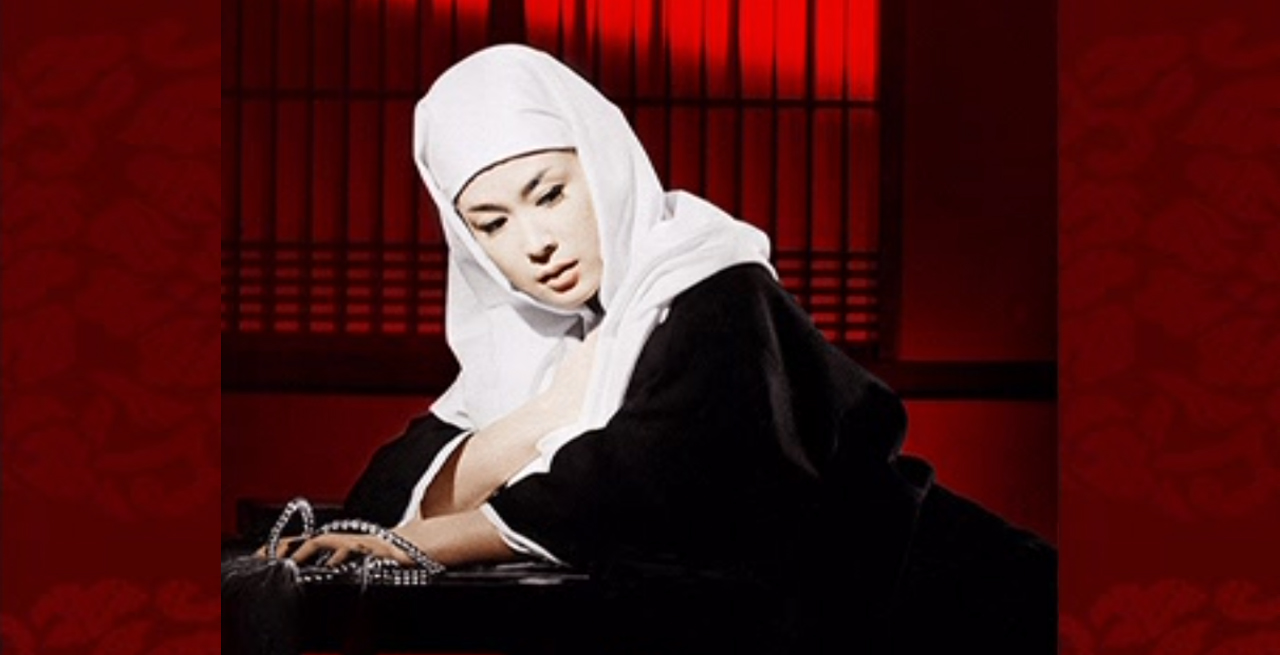
Arguably one of the most celebrated European exploitation subgenres, nunsploitation rose to prominence in the 1970s following The Devils in 1971. Largely driven by Italian productions such as Sister Emanuelle and The Killer Nun, nunsploitation with is irresistibly lurid subject matter, often exploiting themes of sacrilegious lesbianism, was massively influential across the world. Even in a country like Japan where Catholicism is practically non-existent, the genre inspired the cult classic School of the Holy Beast.
However, predating these European films, Japan already had its own modest nunsploitation subgenre which focused on Buddhist temples instead of Catholic convents. Not making nearly the same impact as its later European counterparts, this early Buddhist-flavoured nunsploitation genre largely disappeared by the mid-70s, but that’s not to say that it didn’t have some small impact in the burgeoning pinku scene that was thriving at the time. The earliest of this small group of films is The Virgin Witness which features perhaps one of the earliest depictions of lesbianism in the entire nunsploitation subgenre.


Because of how obscure this film is, Rob has outlined the plot below. If you want to avoid spoilers, skip down to the “Spoilers end here” tag below.
When a teenage girl, Kazue (Michiyo Yasuda), is orphaned after her parents were killed in a typhoon, she is taken in by her aunt and uncle. However, Kazue is loath to obey her foster parents and after a particularly heated argument, brandishes a knife at her aunt. Her uncle, feeling that he can no longer care for her, approaches the local Buddhist temple for help and it is agreed that she will be accepted into a small convent to be taught discipline in an attempt to rehabilitate her. Needless to say, the young high school girl isn’t too thrilled about having to spend her time in a convent with just two nuns and an elderly housekeeper for company. She struggles to adjust to her new life with its restrictive rules and quickly tires of her cleaning chores, fidgets constantly during long chanting sessions, and is less than impressed by the bland food on offer. It’s not long until she starts to sneak out on excursions into town to enjoy the youth culture taken away from her.
The convent, preferring the use of tolerance over punishment allows some leeway towards her youthful rebellion whilst always offering her a safe home to come back to. It’s not too long until she develops a friendship with the younger nun, Chiei (Ayako Wakao), and this soon transforms into a full-on crush. During a calligraphy lesson offered by the convent for local women, Kazue feels that Chiei is treating another prettier teenage girl with favour and becomes insanely jealous, pouring ink all over the girl’s kimono before storming away in a rage. During another one of her trips into town, Kazue is followed home by a group of young men who try to assault her; fortunately, Chiei is close by and saves her before her attackers manage to r*pe her. After this, they become closer with Kazue forming a real attachment to her; relishing every second of contact they have together. Chiei even chaperones Kazue to a rock ’n’ roll gig, but she is blind to the girl’s building infatuation, seeing their relationship as purely sisterly.
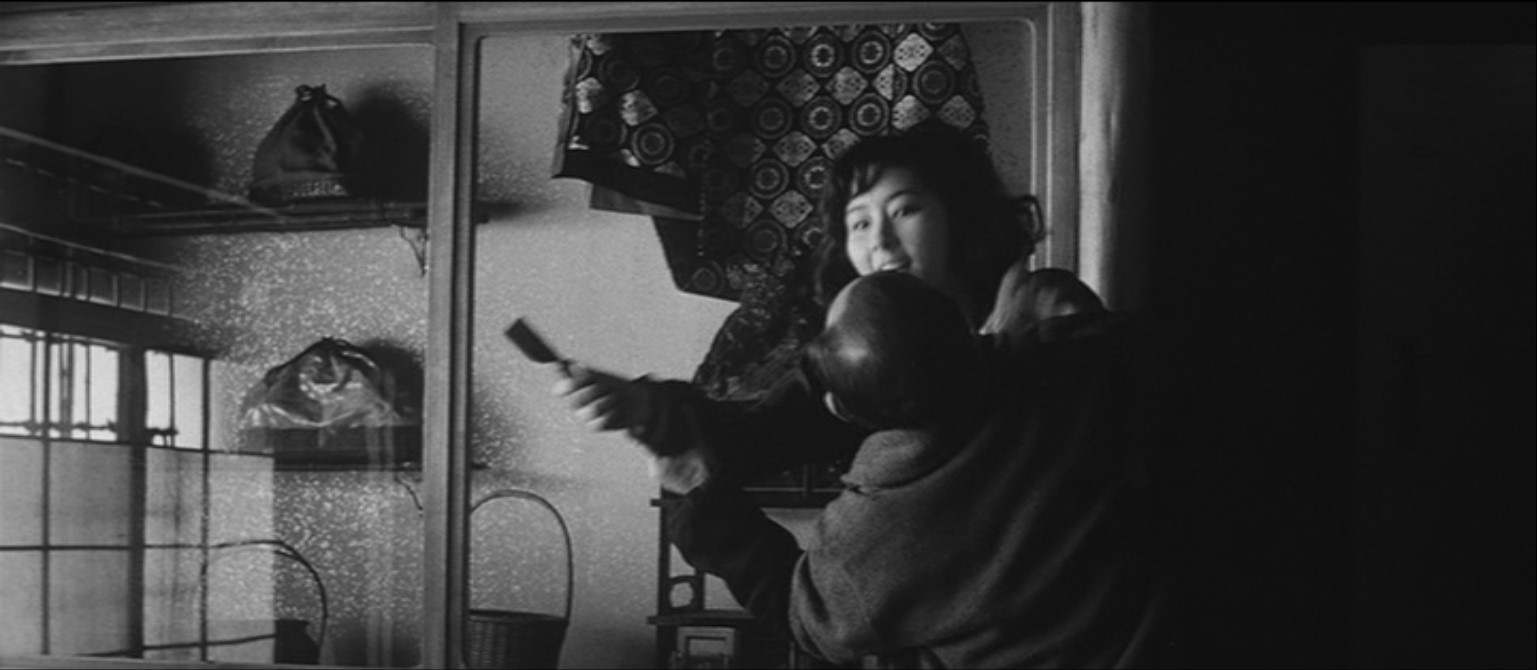
However, this new-found status quo is soon disrupted when a male priest, Yukitoshi (Tomisaburo Wakayama), comes to stay at the convent. Almost immediately, he begins to lust after Chiei, and barely a few days after his arrival, he forces himself upon her. Chiei, feeling unable to speak out against the high-status priest, is forced to tolerate the continued presence of her rapist following the attack. This inaction merely emboldens Yukitoshi as he now feels practically entitled to the abuse of Chiei. Despite her mistreatment, Chiei’s repressed sexuality is forced to the surface and she begins to consensually participate in the affair with Yukitoshi. Chiei is deeply ashamed of their sinful coupling and spends long nights chanting in an attempt to clear her conscience. Her gnawing guilt leads to her spiraling into anxiety and depression, and it is not long until Kazue notices her new friend’s change of character – especially her increased secretiveness when Yukitoshi is nearby.
When Kazue accompanies the other nun and the housekeeper on a shopping trip, leaving Chiei and Yukitoshi alone together in the convent, her curiosity gets the better of her and she sneaks back to confirm the fact of Chiei’s affair once and for all. The consequences of the carnal affair eventually come crashing down when Chiei discovers that she is pregnant; she informs Yukitoshi but he predictably takes no action in response. Kazue finally confronts Chiei about her knowledge of the affair, and blinded by her own jealousy, packs her bags and leaves the convent for good. Chiei, now abandoned by both her friend and lover, cannot endure her struggles anymore and commits suicide by drowning herself. Kazue learns of Chiei’s drowning in the newspaper and returns to the convent where Chiei has left a note for her telling all about her involvement with Yukitoshi. Heartbroken and incensed with rage, Kazue feels compelled to avenge her friend and puts together a plan to seduce and kill Yukitoshi for the abuse that he put Chiei through.
***Spoilers end here!***
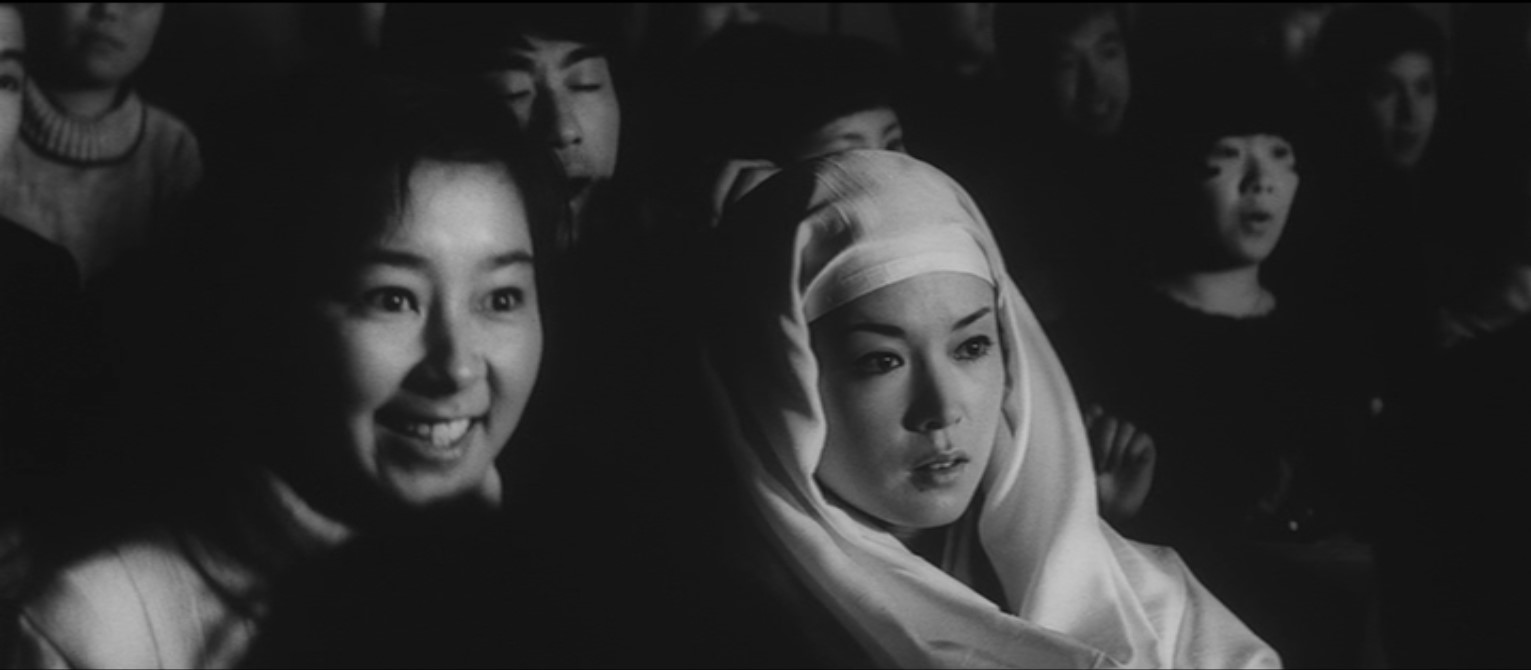
With plots concerning a violently neurotic teenage girl, lesbian desires for an older woman, crises of faith, an abusive love affair, and overarching themes of sinful lust; The Virgin Witness certainly possesses all the facets of a typical nunsploitation film. Nevertheless, despite these exploitation themes, the character driven-drama sits first and foremost above all else. The minimal cast and locations allow the range of performances to shine prominently, feeling almost like a stage play at times. Despite director Kenji Misumi’s forté being action-filled samurai films such as Zatoichi, Lone Wolf and Cub, and Hanzo the Razor, it is clear to see that, with The Virgin Witness, he has a great deal of talent forming brilliantly focused, character-driven dramas. He takes, what on paper could have been just another shallow exploitation film, and instead capitalises on the heavy emotions present, turning it into an excellent piece of understated character examination.
Leading the cast is very much Michiyo Yasuda as the young Kazue. She expertly portrays the inner turmoil of a clearly traumatised young woman from her fits of violent rage, to her childlike tantrums, and finally a deeply confused vulnerable side. She’s truly a fascinating character with so many counteracting emotions bubbling away beneath the surface, all of which are reflected in her expressive eyes. Yasuda resists leaning into just one facet of her character and manages to make the initially delinquent brat extremely sympathetic for the audience as other sides of her complex personality are uncovered throughout the film.
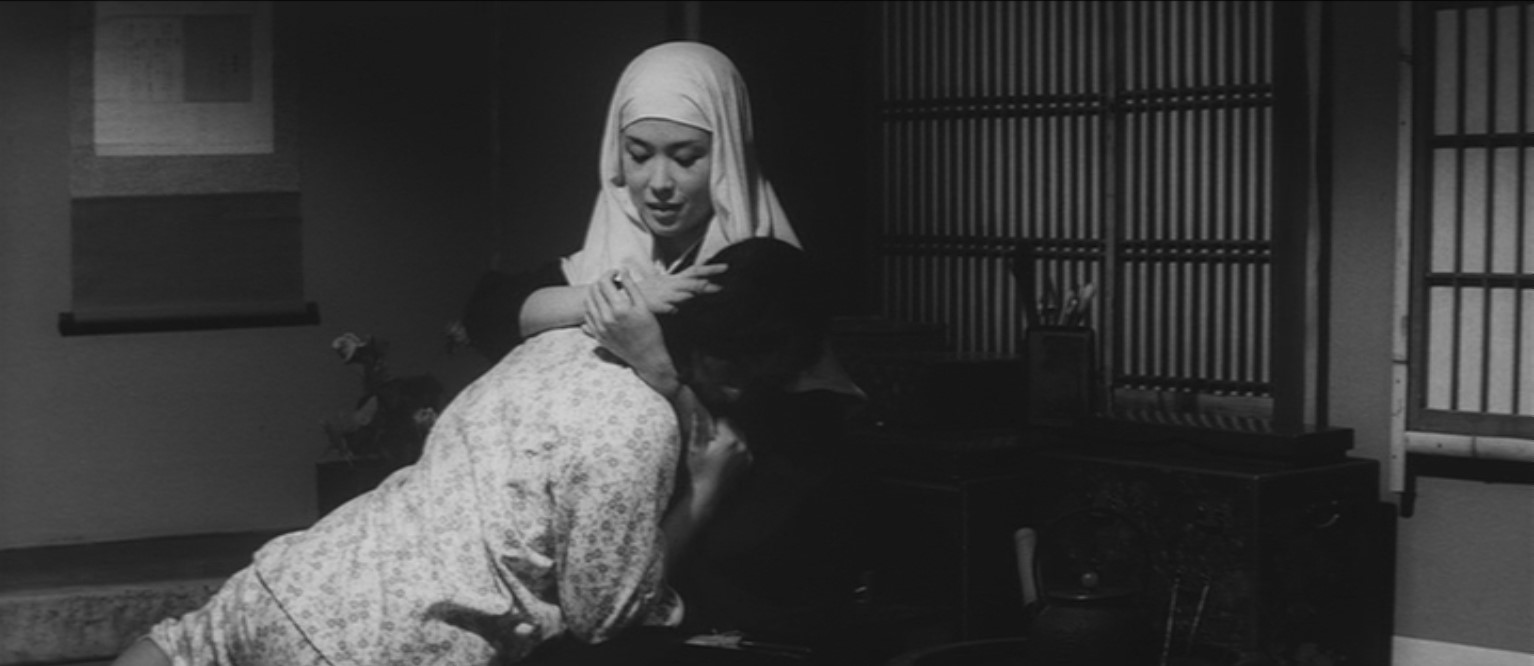
Ayako Wakao’s performance is much more subdued compared to her co-stars, but by no means is that to say that she underacts. Chiei is effectively the opposite of Kazue – whereas Kazue’s emotions are worn on her sleeve and cause her to lash out as she externalises her struggles, Chiei instead suffers in silence. Beneath her demure habit-clad exterior, Chiei is just as angst-filled as Kazue is, communicating to the viewer the great burden of presenting the façade of an infallible and devout servant of the Buddha. Becoming a nun essentially takes away the sense of the individual and it is plain to see how this affects both her temptations and also an unwillingness to burden others with her problems: even in her suicide note to her fellow nun, she refuses to confess how Yukitoshi initially r*ped her.
In many ways, the temple can act as both a community and a prison: for Kazue it helps her to reconcile her emotions and receive calm unbiased guidance, but for Chiei it eventually leaves her feeling alone and isolated at the expense of the Buddhist sense of holisticism. With her growing friendship with Kazue, she realises how much of life she might be missing out on – it is telling that after returning from the gig, her first reaction is anger. Kazue assumes that she is angry at the music itself and the immodest youth they were surrounded by, but in reality, it seems to be regret that she has sacrificed her youth for the temple.
The film has the potential of being a slow-burning tale of unrequited and taboo lesbian desire. The portrayal of Kazue’s crush is unexpectedly tactful for the time period, with a dignified approach refreshingly free of a fetishistic lens. However, with the introduction of Yukitoshi, the building plot of Kazue’s desire grinds to a halt and is abandoned in favour of a fairly hackneyed story surrounding the affair. Whilst this subplot still had the potential of exploring a powerful man using his influence to abuse a vulnerable woman, it instead falls into the all too typical Japanese male power fantasy which centres around the idea that an innocent woman must first be “conquered” by force, and afterward becomes a submissive and docile pet for her abuser and a wanton slave to her awakened sexuality.
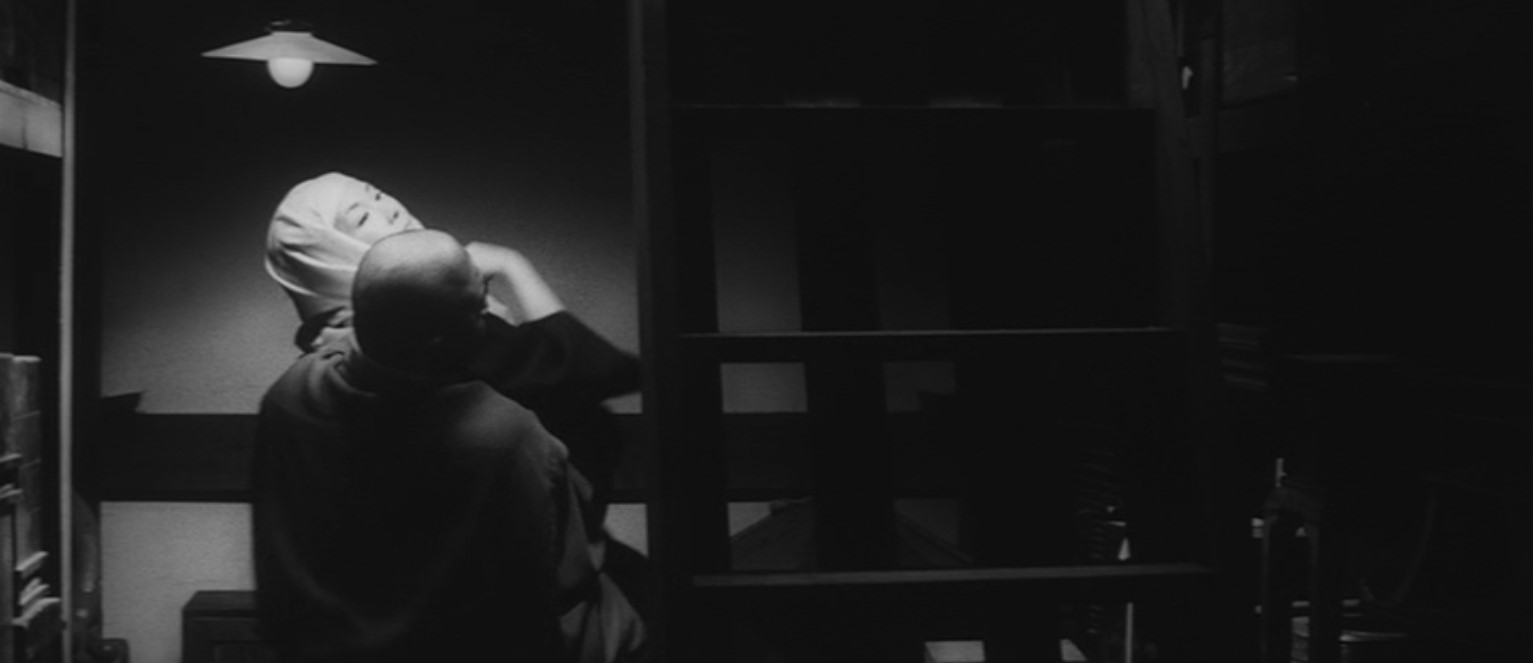
Objectively, it is hard to criticise the inclusion of this sexist trope since it was so hugely prevalent at the time, but it has to be said that with a film that at first made every effort to build realistic and detailed female characters, it is a shame that it feels the need to cater to juvenile pornographic archetypes. By reducing Chiei’s struggle to this archetype, the final act surrounding Kazue’s revenge is also compromised as the film effectively feels like it reverts to melodrama with such a shallow turn of events. By forcing Kazue to the side-lines in order to tell the story of the affair, her personal involvement in the larger story feels missing, and despite her infatuation for Chiei, it becomes somewhat unbelievable that she would go to such extreme measures to avenge her since we never truly see her love blossom. We are led to believe that Kazue would obviously kill for her soulmate, but in reality, we never see much evidence of her having much more than a mere schoolgirl crush – is that really enough to justify her committing murder?
Overall, despite possessing many exploitation and scandalous tropes, The Virgin Witness manages to raise above these and offers an honest, empathetic look at a confused teenage girl struggling with her lesbian desires; and a young woman struggling with the restrictive life of a nun, along with the pressure put upon her by her peers and those looking to take advantage of her. Admittedly, the frustrating inclusion of the stereotypically sexist love affair detracts from the initial impact of the film, however, the strength of Kazue’s brilliantly realised and unique character has the power to rise above this. It is arguably worth watching purely to see such an impressive and nuanced performance by the young Michiyo Yasuda in perhaps one of the strongest roles of her early career. Overlooking its occasional missteps, The Virgin Witness still offers a heart-wrenchingly tragic tale of young love and loss of two troubled young women.
More Film Reviews
Showing as part of the 2021 FrightFest lineup, King Knight marks the fifth feature length film of Richard Bates Jr. Reuniting with fan favorite actor Matthew Gray Gubler, who appeared… If you’re familiar with the name Ryuhei Kitamura, you are most likely familiar with either the beloved zombie action flick Versus (2000), the exquisite jidaigeki (period drama) Azumi (2003), the… Considering the popularity of monster movies being rekindled by Godzilla Versus Kong (2021), the newest entry into the ‘MonsterVerse’, the classic approach to this genre may be coming into a… A Savannah Haunting was an odd but compelling watch at the online edition of the 2021 Dracula Film Festival in Romania. Directed by William Mark McCullough, who is a prolific… Dead Sushi is a 2012 Japanese splatter horror comedy film, written and directed by Noboru Iguchi, with additional writing from Makiko Iguchi and Jun Tsugita. Known for his over-the-top implementation… When the first V/H/S film was initially released in 2012, its impact on the horror community was immediately felt, creating shocking scenarios presented in intimate detail through the found footage…King Knight (2021) Film Review – A Coven Comes Undone
The Price We Pay (2022) Film Review – We All Want To Make A Living Don’t We?
Abyssal Spider (2020) Film Review – Deep-Sea Arachnophobia
A Savannah Haunting (2021) Film Review – Southern Values And Visitations
Dead Sushi (2012) Film Review – Sushi (S)Platter
V/H/S/94 (2021) Film Review – Found Footage Series Back With Vengeance

Hi, I have a borderline obsession with Japanese showa-era culture with much of my free time spent either consuming or researching said culture. Apparently I’m now writing about it as well to share all the useless knowledge I have acquired after countless hours surfing the web and peeling through books and magazines.





